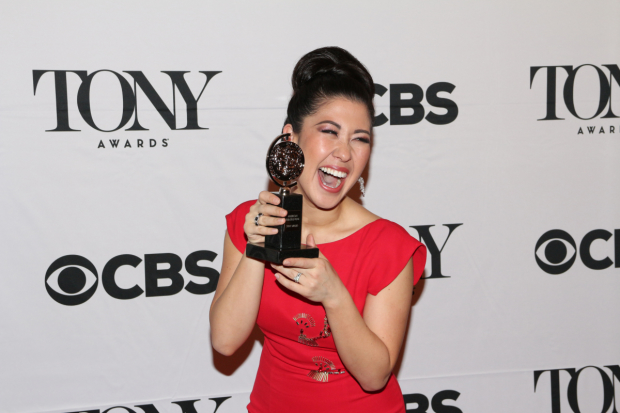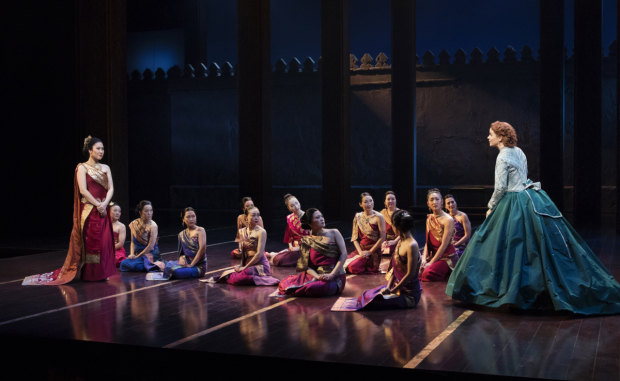The King and I's Ruthie Ann Miles Hopes Her Tony Award Heralds a New Era of Inclusion
New Tony winner Ruthie Ann Miles describes the vibrantly multicultural backstage scene at Lincoln Center's The King and I: "It's really fun to hear everybody connecting," she grinned. "To see, 'Oh, these Korean people don't actually know too much about their Korean heritage, so we're going to learn and we're going to teach. And these people are Japanese and they speak Japanese very well but maybe these people don't, so here's their connection.' It is beautiful to watch the inclusion of everybody."
Before The King and I (her first Broadway show), Miles spent several years of her career performing primarily in the ensembles of regional, touring, and off-Broadway shows like Annie and Avenue Q. Then in 2013, she landed the role of Imelda Marcos in the Public Theater premiere of David Byrne and Fatboy Slim's hit musical Here Lies Love, a part that led directly to her being cast as another first lady in The King and I.
Miles' 2015 Tony for playing the role of Lady Thiang, chief wife to the show's titular monarch, is only the second in the Awards' six-decade history to be presented to an actress of Asian descent (the first was for Lea Salonga for Miss Saigon). It's an honor that Miles, a self-described "ensemble girl," neither anticipated nor, at first, fully understood the weight of. For her, it was an award she earned as a person, not a person with any particular preceding adjectives. But as the reality of the honor is slowly sinking in, Miles is hoping that her recognition will play its small part in extending the kind of inclusion she sees behind the scenes at The King and I to stages across America.

(© David Gordon)
What do the last few years of your career look like from your perspective?
My career definitely took an unexpected change in direction when it came to Here Lies Love. I've always considered myself an ensemble girl, meaning, I was always cast in the ensemble. I think about storytelling from the point of view of somebody who's not in the front lines, and so it was very jarring for me to suddenly be put in the spotlight and to tell the story from the main character's point of view.
Is ensemble work the kind of work that you always wanted to do?
[Going into this career], I wanted to be a part of people who told stories and it didn't occur to me that I might always be in the ensemble or that I might be given the chance to be a leading lady…that never crossed my mind. I just wanted to be a part of telling a story as a group.
As Asian-Americans, we just don't often get the chance to tell the story from a leading person's perspective. And so I took jobs where they came and they were always in the ensemble and if it required me to play multiple instruments I did that and if it was as a puppeteer, I did that. That's just how I was cast, that's how I was employed.
At what point did you realize how unique your Tony win is?
It never crossed my mind because in my mind I don't think of myself as, I am a Korean-American actor. Definitely the Korean culture is very strong to me, and I grew up in Hawaii where Asian-Americans are the dominant culture, but I never thought of myself as the minority. So to be nominated for a Tony and to win a Tony as an Asian-American, to me it just feels like Ruthie was nominated…What's really funny, well, to me, is…I'm actually fifty percent Asian. My dad has blond hair, my grandmother has blue eyes. My daughter has blue eyes and blond hair. So it is pretty funny to me that I'm so heavily identified as an Asian person…Really, the other half of me should be able to play Anna Leonowens.
But when I started to hear from the Asian-American community or strangers on
Twitter [about] how they're inspired that an Asian-American actress was nominated and won in this category, then I started to feel the weight of it, which was huge. It's really quite an honor. There's a twelve-year-old in California who is Vietnamese and she wants to be an actress, but she's never seen Asian-Americans in that kind of role before.
What effect do you hope your win will have?
There are so many talented people in the world, black, white, yellow, whatever, and we want to tell stories too. But oftentimes we get the one token minority role. I hope what [people] hear and see is that there are so many people who are American who don't look like what you think is American. But we're all American and we just want to tell American stories — not Asian-American stories. We want to tell American stories because we're American.
Does it look to you like the situation is improving?
I'm a hopeful person by nature…I like to think that when we speak to our directors and we speak to casting directors, they hear us and they see us. And the writers that we know, a lot of them are of color, and they are writing from a point of view that includes themselves. I think that's hopeful.
After The King and I, what kind of a project would you like to do next?
I really just need to connect with the person that I'm reading. And if I see the light of her in me, if we connect, then I'm interested. And if not, I'm not. I do think that the strongest character is somebody that you can connect with to your personal self, or at least find the humanity in both of you and start from there.

(© Paul Kolnik)










